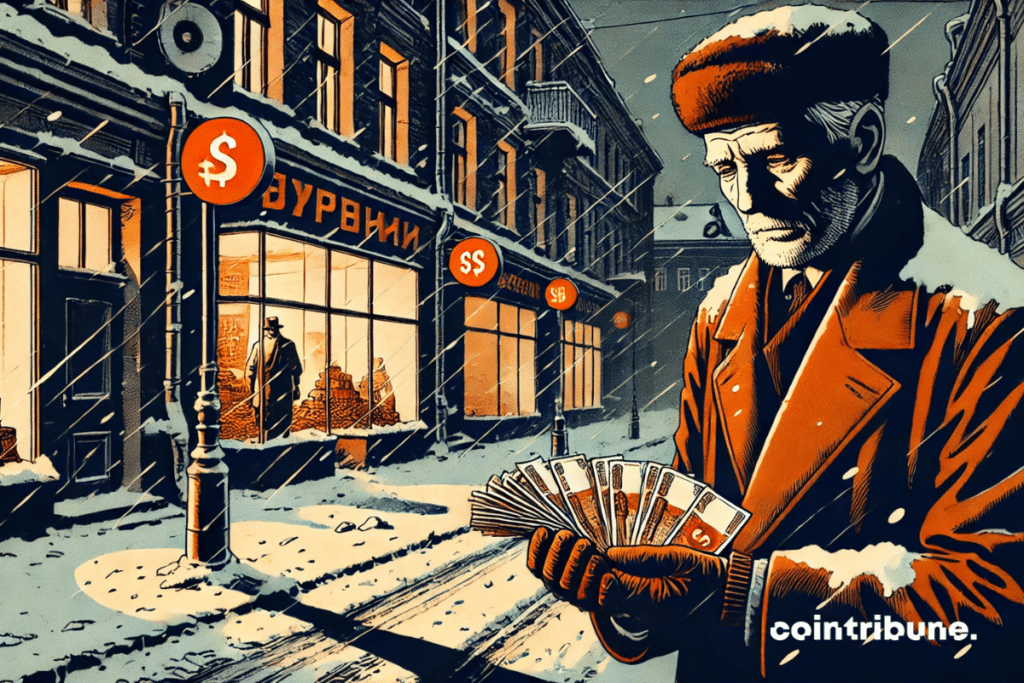Inflation spikes in Russia as war shapes its economy
The Russian economy is undergoing an unprecedented storm. While the rest of the world observes controlled fluctuations, Russia is struck by exponential inflation, a reflection of an economy entirely geared towards war. Prices are skyrocketing, the labor market is contracting, and social tensions are intensifying. This situation, far from being trivial, raises questions about the country’s economic future.

An inflationary spiral fueled by war
Prices for essential goods, such as butter, meats, and onions, have jumped by 25% in just one year, according to official data. In response to this surge, some large retailers have been forced to lock up basic products to prevent theft, a scene that has gone viral on Russian social media. With an inflation rate hovering around 10%, well beyond central bank forecasts, the Kremlin sees its economy wobble under the pressures of a monetary and fiscal policy focused on the war effort. Indeed, Alexandra Prokopenko, an analyst at the Carnegie Russia Eurasia Center, explains: “Prices are rising due to the war. Demand in the economy is directed towards unproductive spending, while wages are climbing to compensate for a labor shortage.”
This shortage is largely due to massive military mobilization. The government is dedicating billions to the defense industry, which is causing a surge in wages in that sector and forcing other industries to raise theirs to attract non-mobilized workers. This dynamic creates a vicious cycle, where rising wages fuel inflation, forcing companies to pass these costs onto their product prices. In response, the central bank has raised its key interest rate to a record level of 21%, an effort welcomed but deemed weak by many economists who foresee increased inflationary pressure in the coming months.
Social fractures and the limits of an economic model
While some benefit from this war economy, such as workers in the military industry or soldiers, a large part of the population suffers. Teachers, doctors, and retirees are the most exposed. Their incomes stagnate, preventing them from keeping up with the rapid pace of rising prices. At the same time, rural and peripheral regions, historically less favored, struggle to absorb these economic shocks, creating inequalities between major metropolitan areas and the rest of the country. Prokopenko points out that this crisis sheds light on “growth without development,” where money circulates but without improvement in infrastructure or public services.
The outlook is equally mixed. As the working population continues to decline, with a projected reduction to 142 million inhabitants by 2030 according to the United Nations, Russia will need to find solutions to cope with an aging and dwindling workforce. The traditional reliance on workers from Central Asia is compromised by a rise in xenophobic sentiment and increased competition from other regions such as the Middle East and South Korea. Finally, international sanctions, although avoidable in the short term through parallel circuits, threaten the long-term stability of strategic sectors like energy.
The Russian economy, supported by oil revenues and a model temporarily adapted to war, remains surprisingly resilient. However, this resilience could collapse under the weight of structural imbalances and risky economic choices. Should international sanctions, a decline in commodity prices, or a slowdown in Chinese demand intensify, Russia’s future could become even more uncertain. The real test will come with the end of the war, when it will be necessary to redirect the economy, manage the return of soldiers, and rebuild a shaken social equilibrium.
Maximize your Cointribune experience with our "Read to Earn" program! For every article you read, earn points and access exclusive rewards. Sign up now and start earning benefits.
Diplômé de Sciences Po Toulouse et titulaire d'une certification consultant blockchain délivrée par Alyra, j'ai rejoint l'aventure Cointribune en 2019. Convaincu du potentiel de la blockchain pour transformer de nombreux secteurs de l'économie, j'ai pris l'engagement de sensibiliser et d'informer le grand public sur cet écosystème en constante évolution. Mon objectif est de permettre à chacun de mieux comprendre la blockchain et de saisir les opportunités qu'elle offre. Je m'efforce chaque jour de fournir une analyse objective de l'actualité, de décrypter les tendances du marché, de relayer les dernières innovations technologiques et de mettre en perspective les enjeux économiques et sociétaux de cette révolution en marche.
The views, thoughts, and opinions expressed in this article belong solely to the author, and should not be taken as investment advice. Do your own research before taking any investment decisions.